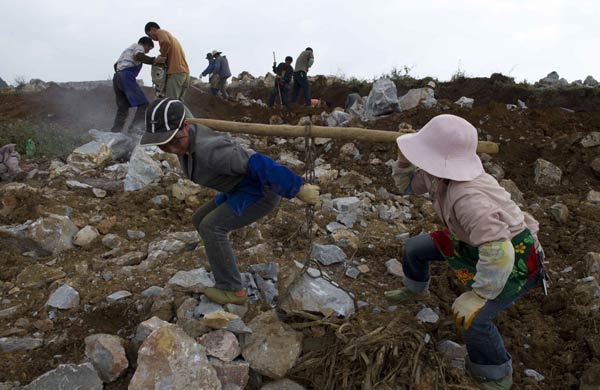Society
Plans afoot to push back stony deserts
By He Dan and Li Yingqing (China Daily)
Updated: 2011-04-18 07:54
 |
Large Medium Small |
WENSHAN, Yunnan - Liu Defang, a 71-year-old farmer in Southwest China's Yunnan province, has witnessed great changes since the village he lives in started a battle against desertification.
 |
|
Residents of the Wenshan Zhuang and Miao autonomous prefecture, Yunnan province, move stones on a hill in an attempt at reclaiming land. [Photo/for China Daily] |
Back in 1960s, Liu and his fellow villagers in Jianglong village, Wenshan Zhuang and Miao autonomous prefecture, had slashed and burned trees for cooking and were eager to reclaim arable land from nearby forests, Liu recalled.
"But as time went by, we saw that the forests were becoming stony deserts," Liu told China Daily. "And the only well in the village gradually dried up."
Liu and his fellow villagers soon had to travel more than two hours to find drinking water. Largely because of the increasing infertility of the soil, their grain yields decrease from year to year.
Floodwaters came regularly during the rainy season and would linger for at least half a month, Liu added.
In response, villagers decided to give up traditional farming practices, which they realized had been giving them a livelihood at the expense of the environment. Since the 1990s, the local government has aided them in their adoption of modern agricultural techniques.
"The government helped us to use gases (from manure and decaying plant waste) to make energy and install equipment to make use of solar energy," Liu said.
Further work was done to plant trees, he said.
| ||||
The average income for farmers in the village was 208 yuan ($32) a year in 1990 but reached 5,600 yuan a year in 2010. Most of it came from raising pigs and other livestock, he said.
Statistics from the State Forestry Administration show that China has about 450,000 square kilometers of karst topography landscape - land that has been formed through the dissolution of bedrock. Of that, nearly 130,000 sq km have deteriorated to the point of becoming stony deserts.
Eight regions including Yunnan and Guizhou provinces and Chongqing municipality have been plagued by incursions of stony deserts.
Even more alarming, the number of square kilometers encompassed by stony deserts is expanding at a rate of 2 to 4 percent every year.
Desertification is still a major threat to China's karst terrain areas, since it leads to water shortages, severe soil erosion and frequent natural disasters, said Kong Chuizhu, vice-governor of Yunnan, at a national meeting to fight desertification on Friday.
The National Development and Reform Commission and Yunnan government jointly held the meeting in Wenshan.
Since 2008, China has tried to explore possible ways to fight desertification, running pilot projects in 100 counties in Southwest China.
Using tree planting, about 30,000 sq km of land have been reclaimed from stony deserts in the past three years, said Yin Hong, deputy head of State Forestry Administration.
Stony desertification has also dragged vast numbers of people into poverty, said Wang Guoliang, deputy director of the State Council Leading Group Office of Poverty Alleviation and Development.
The work to control stony desertification has therefore been joined to efforts to improve local people's livelihoods, Wang added.
The campaign to control stony desertification will be extended to 200 counties throughout the country by the end of 2015. Its goal is to turn another 40,000 sq km of stony deserts into forests, said Du Ying, vice-minister of the National Development and Reform Commission.
| 分享按钮 |



